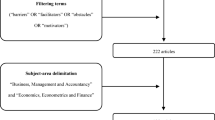Abstract—
The article discusses a number of key provisions on the predictive prospects for the development of research and development (R&D), presented by a team of authors of the Institute of Economic Forecasting, Russian Academy of Sciences (IEF RAS) in a monograph that provides a detailed description of the current state of Russian R&D, highlights the main problems that prevent the full realization of its potential to enhance innovation, and measures to improve efficiency and effectiveness are substantiated. The article draws attention to the need to take into account the the specific features of the Russian national innovation system (NIS), the incompleteness of the formation which does not allow it to fully function in the market. Attention is drawn to the differences in the dispositions of the state and business in the innovation process, to the new quality of business processes due to the influence of the communication revolution, to the importance of interaction with the global innovation system. A systematic approach to taking into account new phenomena should be reflected in a more complete adaptation of the NIS to market conditions and an increase in its effectiveness in the process of modernizing social production.
Similar content being viewed by others
Notes
The current Federal Law On the Transfer of Rights to Unified Technologies, dated 25.12.2008, no. 284-FZ, firstly, was not initially a law of direct action, requiring specification in by-laws and, secondly, the transfer of technologies in it includes their redemption through the organization of an auction sale with the involvement of independent appraisers, etc. Al-most three decades ahead of it, the Bayh–Dole Act is an order of magnitude simpler.
It is considered to be the most successful law passed in the US in the last 50 years.
The first system of scientific and technical priorities and critical technologies was released in 1996.
In the Soviet Union, the slogan “to overtake without catching up” was cultivated.
Field-Weighted-Citation-Impact (FWCI) is the ratio of the number of citations of the analyzed publications to the average number of citations of publications of the same type, in the same field and for the same period.
https://www.pwc.es/es/strategyand/assets/2018-global-innovation-1000-fact-pack.pdf15; https://www.strategy-business.com/-interactive/Where-Companies-Spend-Their-RD-Money?gko=-84dc2. Accessed January 3, 2023.
https://www.strategy-business.com/interactive/Where-Companies-Spend-Their-RD-Money?gko=84dc2. Accessed January 3, 2023.
https://www.rbc.ru/economics/17/08/2015/55d1d2959a79479afc4a4a-f8. Accessed December 29, 2022.
REFERENCES
On the Long-Term Scientific and Technological Development of Russia: Monograph, Ed. by D. R. Belousov and I. E. Frolov (Dinamik Print, Moscow, 2022) [in Russian].
N. Vonortas, “The role of universities in the ‘knowledge triangle’,” Forsait 11 (2), 7 (2017).
Science Indicators: 2021. Stat. Coll. (Vysshaya Shkola Ekon., Moscow, 2021) [in Russian].
I. G. Dezhina and A. K. Ponomarev, “Approaches to ensuring the technological independence of Russia,” Upr. Naukoi: Teor. Prakt. 4 (3), 53–68 (2022).
Yu. V. Yaremenko, Structural Changes in the Socialist Economy (Mysl’, Moscow, 1981) pp. 63–68 [in Russian].
A. G. Fonotov, Russia: From a Mobilization Society to an Innovative One (Nauka, Moscow, 1993) [in Russian].
P. V. Orekhin and P. N. Netreba, Russia in the New Era: Choice of Priorities and Goals of National Development: Expert Report, Ed. by Ya. I. Kuz’minov (Vysshaya Shkola Ekon., Moscow, 2020) [in Russian].
E. Helpman, Understanding Global Trade (Harvard Univ. Press, London, 2011; Institut Gaidara, Moscow, 2017).
America and the International Future of Science. REPORT/PROJECT: Challenges for International Scientific Partnerships, American Academy of Arts and Sciences, December 2020. https://www.amacad.org/publication/international-science. January 3, 2023.
A. Sood and G. J. Tellis, “Technological evolution and radical innovation,” J. Mark. 69 (3) (2005).
N. Fligstein, The Architecture of Markets: An Economic Sociology of Twenty-First-Century Capitalist Societies (Princeton Univ. Press, Princeton, 2002; Vysshaya Shkola Ekon., Moscow, 2013).
G. Kuznetsova, “Main trends in the world market of foreign direct investment in 2014. The situation in Russia,” Nats. Interesy: Prioritety Bezop., No. 42, 40–51 (2015).
UNCTAD, World Investment Report 2005 – Transnational Corporations and the Internationalization of R&D: Overview (United Nations, New York; Geneva, 2005).
L. N. Yurovskii, Monetary Policy of the Soviet Government (1917–1927). Selected Papers (Nachala, Moscow, 1996) [in Russian].
J. Studwell, How Asia Works: Success and Failure in the World’s Most Dynamic Region (Grove, New York, 2014; Al’pina, Moscow, 2021).
E. P. Glazunov, “To the 35th anniversary of the Sino-Vietnamese armed conflict,” Yugo-Vost. Aziya: Aktual. Probl. Razvit., No. 23, 117–125 (2014).
S. S. Donetskaya and Li Menzhan’, “Chinese students abroad: The dynamics of the number and purpose of departure,” Vysshee Obraz. Ross., No. 6, 154–156 (2020).
Author information
Authors and Affiliations
Corresponding author
Ethics declarations
The authors declare that they have no conflicts of interest.
Rights and permissions
About this article
Cite this article
Fonotov, A.G. Science as an Object of Management and as a Development Factor. Stud. Russ. Econ. Dev. 34, 389–398 (2023). https://doi.org/10.1134/S107570072303005X
Received:
Revised:
Accepted:
Published:
Issue Date:
DOI: https://doi.org/10.1134/S107570072303005X




